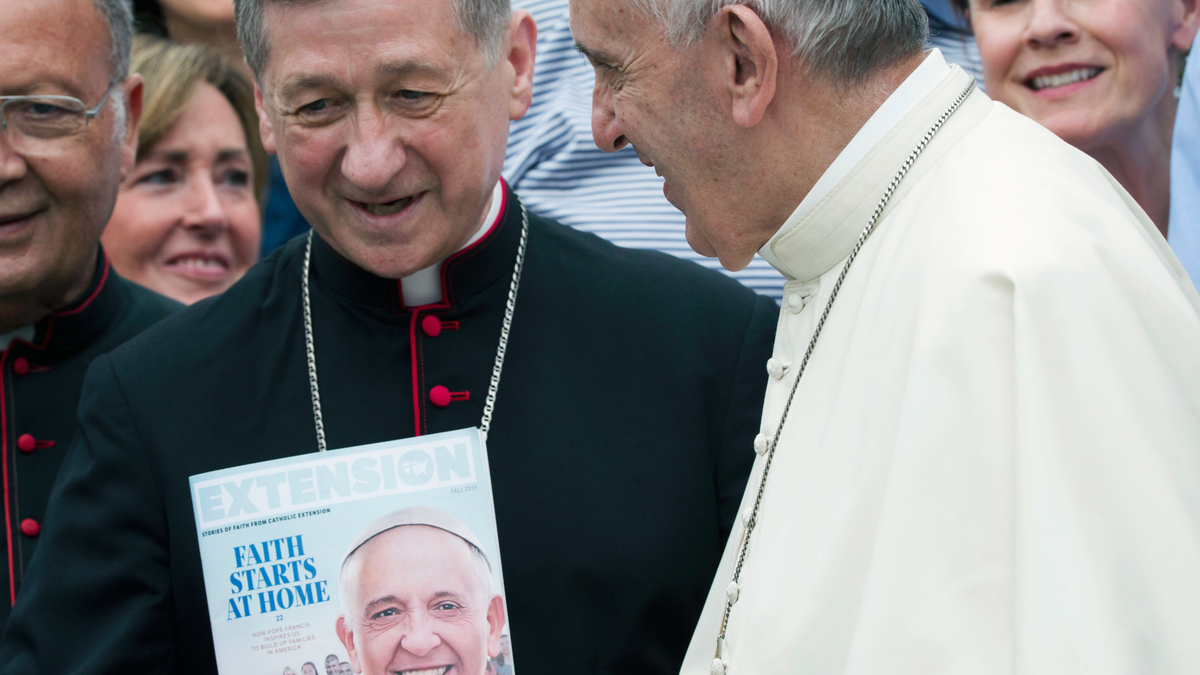
FILE - In this Sept. 2, 2015, file photo, Pope Francis, right, salutes Chicago Archbishop Blase Joseph Cupich at the end of his weekly general audience in St. Peter's Square at the Vatican. Pope Francis, in an eight-page letter addressed to U.S. bishops meeting in Mundelein, Ill., and released to the media Thursday, Jan. 3, 2019, is encouraging bishops to unify as the Catholic church deals with a "crisis of credibility" stemming from the clergy sex abuse scandal. (AP Photo/Alessandra Tarantino, File)
Pope Francis is encouraging U.S. bishops meeting near Chicago to unify as the Roman Catholic church deals with a "crisis of credibility" stemming from the clergy sex abuse scandal.
In an eight-page letter addressed to the bishops and released to the media Thursday, Francis acknowledged that "no response or approach seems adequate" to the crisis. Still, he wrote, all church leaders must reckon with parishioners' pain, heal internal divisions and devise specific approaches that go beyond "creating new committees or improving flow charts."
"I would like to draw near to you as a brother and to reflect with you on some aspects that I consider important," Francis wrote, "while at the same time encouraging your prayer and the steps you are taking to combat the 'culture of abuse' and to deal with the crisis of credibility."
The pope did not specifically say he is part of the credibility crisis, but he considers himself personally engaged and involved in the rehabilitation effort. In an April letter to Chilean bishops, he admitted he made "grave errors" in judgment in that country's sex abuse scandal, and invited the abuse victims he had discredited to Rome to beg their forgiveness. But there, too, he made clear that the bishops needed to "repair the scandal where possible and re-establish justice."
In his Christmas address, Pope Francis made an unprecedented call for priests who had abused children to turn themselves in, and vowed the church will "never again" hide their crimes.
Francis suggested the U.S. bishops hold the weeklong retreat for prayer and spiritual reflection and dispatched the Rev. Raniero Cantalamessa, the official papal preacher, to lead it. The event at the Mundelein Seminary near Chicago is a prelude to a high-stakes summit of the world's bishops at the Vatican next month to forge a comprehensive response to the crisis engulfing the church.
Terence McKiernan, co-director of BishopAccountability.org, which has tracked abuse for more than a decade, said victims are mentioned only fleetingly in the papal letter.
"Only by concentrating on the victims, not on themselves, can the bishops remedy this situation and save the church," he said.
Francis' call for unity was poignant, given the stark chasm in the U.S. church between conservative and more moderate bishops, divisions that have only grown deeper since his election.
After two doctrinaire-minded popes, St. John Paul II and Benedict XVI, championed conservative culture warrior bishops, Francis has tended to appoint more pastorally moderate ones. Their divisions have come to the fore over Francis' outreach to divorced and civilly remarried Catholics, as well as to gays, and have sharpened as the church struggles with an explosion of abuse allegations.
Conservative bishops have called for Francis to respond to an ex-Vatican ambassador's claims that he covered up for ex-Cardinal Theodore McCarrick.
The letter's publication came on the same day that The Associated Press reported it found U.S. dioceses have released the names of roughly 1,000 priests and others accused of sexually abusing children. Nearly 50 dioceses and religious orders have publicly identified child-molesting priests in the wake of a Pennsylvania grand jury investigation report issued in August, and 55 more say they plan to do so in the next few months.
A blistering report released last month by the Illinois attorney general found the state's dioceses have not released the names of at least 500 accused clergy. The allegations date back decades and include some deceased priests.
Abuse victims and their attorneys in Chicago on Thursday launched a statewide effort dubbed Fight for 500, which seeks to uncover the priests' identities. They were, among other things, calling for the release of "files pertinent to the histories of each priest so the public, police and parishioners know who was complicit in the ongoing concealment of this hazard."
In this week's letter, Francis wrote that church leaders must find "a collegial and paternal way of embracing the present situation, one that, most importantly, can protect those in our care from losing hope and feeling spiritually abandoned."
"Let us try to break the vicious cycle of recrimination, undercutting and discrediting, by avoiding gossip and slander in the pursuit of a path of prayer and contrite acceptance of our limitations and sins," he wrote.
___
Karoub reported from Detroit. Associated Press writer Nicole Winfield contributed from San Vigilio, Italy.
___
Jeff Karoub is a member of AP's Race and Ethnicity Team and frequently writes about religion. Follow him on Twitter at https://twitter.com/jeffkaroub .








































